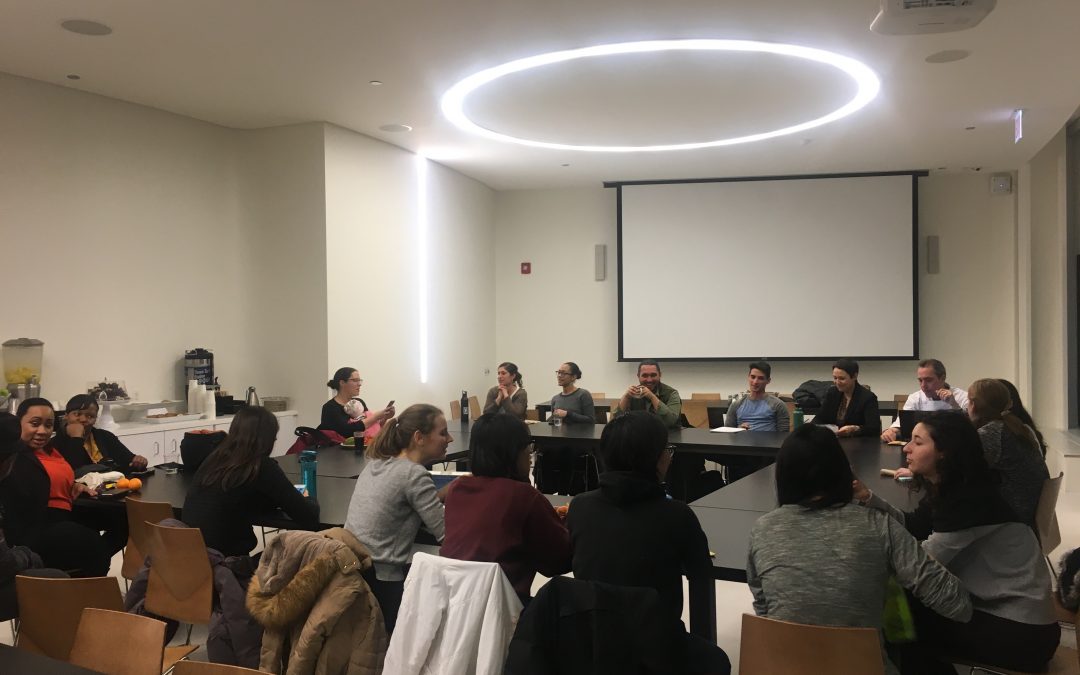To kick off the Town Hall, panelists described their involvement with sustainability on campus. Bon Appetit’s representatives detailed several waste-minimizing projects, such as the Farm-to-Fork program, which requires a certain percentage of the food used in University dining to be sourced within a 150-250 mile radius of the University. The program is currently operating at 20% locally-sourced food, and aims to expand to greater percentages as more local vendors are identified. Students are able to make vendor suggestions, or otherwise give feedback for dining operations, through a variety of channels: by submitting a feedback form on the UChicago Dining Website, by filling out comment cards in the dining halls, or by contacting their Dining Committee member within the housing system. Bon Appetit also has several programs to reduce pre-distribution food waste. Their Imperfectly Delicious Produce program sources produce from farmers that does not cosmetically conform to the standards set by grocery stores for display, incorporating this “imperfect produce” into the dining halls’ menus, which are redesigned each week. A similar program focuses on reducing meat waste by repurposing meat whose cut quality falls below pristine restaurant requirements, incorporating the ground meat into dining hall dishes.
Windy City Harvest’s farmer and program coordinator Paul Krysik detailed his involvement with food sustainability by highlighting the non-profit’s Incubator program, which subsidizes land, access to water, access to a food processing station, and access to markets for individuals who finish their apprenticeship program in order to help reduce the high barrier of starting a new farming business. Windy City Harvest is a network of farms in the city of Chicago, some of which sell to Bon Appetit, and use a variety of innovative farming methods such as aquaponics.
UChicago Law student Leah Garner cited her early interest in law and involvement within UChicago’s Environment, Agriculture and Food Group (EAF) as an undergraduate as the foundation for her decision to begin a career in Environmental Law. As part of her efforts within the Environmental Law Society (ELS), Leah recently championed a composting program for the Law School. The ELS also organizes periodic Lunch Talks; sign up for their Blueprint list-serve for event announcements and activity updates here.
Undergraduate Connor Sauceda grew his early interest in sustainability through his efforts with the Food Recovery group within the University’s Phoenix Sustainability Initiative. Food Recovery primarily recovers food from events held by student organizations on campus, donating food surpluses to willing recipients, such as the Chicago Student Life Center. The group has formed a recurring partnership with the Hillel organization, recovering food from Hillel’s Friday dinners. In an effort to further grow the program by catering to smaller-scale food surpluses, the Food Recovery group is in the process of creating a “Food Watch” program, wherein students will be able to post announcements about leftover food from events in a centralized location on Facebook in order to distribute the food to nearby hungry students.
Throughout the event, students in attendance were able to pose questions to the panelists directly. A student asked about the possibility of composting in the dining halls, to which the Resident Manager of the Bon Appetit on campus responded by describing the operation and drawbacks of a previous composting program organized by Aramark. The major obstacle to composting was storage of the food waste, which had to be collected, refrigerated, and transported in compliance with the University’s strict sanitation rules. The outlook for composting in the dining halls in light of these storage and transportation obstacles appears bleak.
Another student wondered about the plates at the Kosher station, which had recently been switched from paper to plastic plates. Surprisingly, the reason for the arguably environmentally-unfavorable switch was to better match the aesthetic of the dining halls. The environmental cost of using plastic rather than paper plates far exceeds the aesthetic benefits of an item that will undoubtedly end up in the landfill: the plate will be looked at for less than an hour, but will spend several hundred years in a landfill. This makes UChicago Dining’s decision to switch to plastic plates astoundingly inconsiderate. Students who similarly find this reason problematic should submit feedback through the various channels provided by Bon Appetit.
The town hall ended with a brief discussion of communication between the different sustainability-focused organizations on campus, highlighting the necessity of student ideas and feedback for the development of sustainable projects and decisions at UChicago. For example, the residence halls are piloting a Green Czar program, in which each house elects a representative to facilitate sustainability initiatives within the dorms. Contingent on the success of its pilot phase, the program will grow into a platform for house competitions, including a recycling competition in which houses would compete to see who could properly sort the most waste. The hope is to launch the program in full for the 2018-19 school year, with Green Czars in each house on campus. The Green Czar program will be a great way to bring sustainability to the residence halls, allowing students to contribute to and learn from initiatives like the Sustainable Dining Week.

